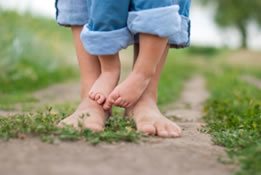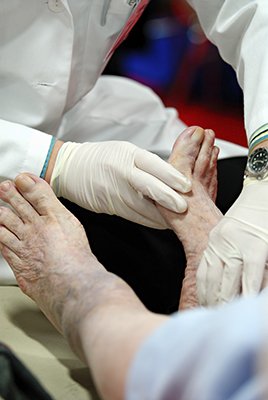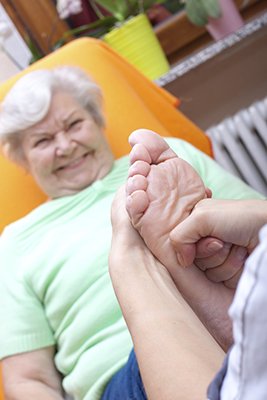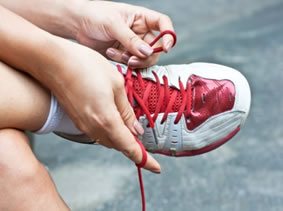Items filtered by date: April 2025
How to Care for Diabetic Foot
Millions of people are affected by diabetes each year. Diabetes damages blood vessels in all parts of the body, especially the feet. The legs and feet may develop slow blood flow, which causes neuropathy, or nerve damage. Once a diabetic patient develops neuropathy, it is important that the feet are well taken care of. Otherwise, the lower limbs may have to be amputated. This only happens in drastic cases, but it shows how seriously diabetic foot care should be taken.
It is very important to always wash and dry the feet thoroughly, especially in between the toes, if you’re a diabetic. Secondly, examining your feet and toes for redness or sores must be done, even if you do not feel pain. You may also want to examine your feet from the bottom. Try to avoid wearing colored socks to prevent infections that may occur from the dye. Well-fitting socks are also highly recommended.
A diabetic’s physician should always monitor their blood levels to test how well blood sugars are being maintained. In addition to giving advice about everyday eating habits and foot care, a physician may prescribe medicine to help with the diabetic patient’s neuropathy. It is also advised to see a podiatrist if experiencing any feet conditions. Toenails may also need to be taken care of by a podiatrist. This prevents patients from cutting too deeply around their cuticles, which can lead to infection.
A person can take care of their feet at home by following the instructions of their physician. Using creams on one’s feet is also an effective way to heal dryness. Proceed with caution when using tools to remove calluses, as severe diabetics may not be able to feel pain on their feet. If any complications arise do not hesitate to contact a podiatrist.
On a daily basis, diabetic feet must be checked. If you are ever concerned about something, contact your health care professional. You never want to wait until a wound becomes too severe to treat. If left untreated, gangrene may develop. Gangrene is a serious infection that can lead to sepsis or amputation. It is also important for diabetics to be on the lookout for ulcers. Ulcers are sores that develop from tissue loss on the skin. They can be quite painful and require intensive treatment. Early treatment and everyday inspection are imperative to staying healthy.
What to Do to Keep Your Child’s Feet Healthy
Being a parent involves caring for your child in every way you can. You make sure they are eating the right food, being nice to others, and staying out of any trouble. However, it is also important that you are watchful of their health, more specifically their foot health. Maintaining good foot health in childhood is important in preventing later conditions in life from happening. As children continue to develop, their feet require different techniques of care. Here are some various ways in which you can help your child’s feet stay healthy.
A baby needs a lot of care and attention overall, but the importance of their feet should never be forgotten. Before a baby turns one, their feet change and develop greatly. It is important that during this time, a mother avoids putting tight socks on their child. She should also encourage movement of their feet so the baby can begin to feel more comfortable using them.
As a baby enters the toddler years of his or her life, they are begin to walk around. When your baby begins to take those first steps, it is crucial that they are wearing protective shoes on their feet. As a mother that is observant of your child’s feet, you may notice changes in them. This is completely normal as the feet are becoming susceptible to the activity of walking. It is normal for a toddler to be a bit unsteady or to “walk funny” at first.
When your child grows out of their toddler years, it is important that you begin to show him or her how to care for their feet on their own. Practice with your child proper hygiene in order to prevent foot fungus or infection. Since children are constantly on the move, it is crucial to be cautious of any accidents or injuries that might occur. If an injury occurs, it is advised that you take your child to be examined by a doctor immediately. Since your child is still growing, particular injuries can shift the way in which a bone or other important part of the foot is developing.
Babies and kids are always changing and growing. Your job as a parent is to make sure they stay healthy and making sure they are properly maintained. This involves proper foot care and making sure the feet stay healthy. Following this guide, your child can live a long and happy life.
Boots for Yoops Seeks to Collect Shoes for Children in Need
 A new campaign launched by the Salvation Army is aiming to keep children’s feet warm and dry this winter season. The campaign, Boots for Yoops, is collecting boots, shoes, and socks for various children in need. Leonita Schweigert, the campaign’s creator, shared, “I decided instead of duplicating services and doing Coats for Kids like everybody does, that there are so many kids without proper shoes. To determine who exactly is in need of winter shoes, Schweigert contacted local schools to obtain names and sizes of children in need. New shoes and boots are being requested as to avoid potential health issues, such as Athlete’s foot. While the campaign was off to a slow start in December, Schweigert is hopeful it will amass enough for those in need once it completes its run through the end of February.
A new campaign launched by the Salvation Army is aiming to keep children’s feet warm and dry this winter season. The campaign, Boots for Yoops, is collecting boots, shoes, and socks for various children in need. Leonita Schweigert, the campaign’s creator, shared, “I decided instead of duplicating services and doing Coats for Kids like everybody does, that there are so many kids without proper shoes. To determine who exactly is in need of winter shoes, Schweigert contacted local schools to obtain names and sizes of children in need. New shoes and boots are being requested as to avoid potential health issues, such as Athlete’s foot. While the campaign was off to a slow start in December, Schweigert is hopeful it will amass enough for those in need once it completes its run through the end of February.
Making sure that your children maintain foot health is very important as they grow. If you have any questions, contact Dr. Ronald Sheppard from Warren-Watchung Podiatry Center. Our doctor can provide the care you need to keep you pain-free and on your feet.
Keeping Children's Feet Healthy
Having healthy feet in childhood can help prevent medical problems later in life, namely in the back and legs. As children grow, their feet require different types of care from birth to school-age.
Although babies do not walk yet, it is still very important to take care of their feet.
- Avoid putting tight shoes or socks on his or her feet
- Allow the baby to stretch and kick his or her feet to feel comfortable
As a toddler, kids are now on the move and begin to develop differently. At this age, toddlers are getting a feel for walking, so don’t be alarmed if your toddler is unsteady or ‘walks funny’.
As your child gets older, it is important to teach them how to take care of their feet
- Show them proper hygiene to prevent infections such as fungus
- Be watchful of any pain or injury
- Have all injuries checked by a doctor as soon as possible
- Comfortable, protective shoes should always be worn, especially at play
If you have any questions please feel free to contact our office located in Watchung and Marlboro, NJ. We offer the newest diagnostic and treatment technologies for all your foot and ankle needs.
Diabetic Foot Amputations
 Diabetic foot care is something that should be taken very seriously, because numbness and loss of feeling is very common, due to the lack of circulation in the legs and feet. Treating these symptoms with haste could prevent the detection of problems such as ulcers. Ulcers, coupled with inordinately slow healing, can cause infections to persist, spread, and even lead to amputation. It is vital to make sure to look out for these symptoms, and you should see a doctor immediately if signs of sores, numbness, and loss of feeling occurs.
Diabetic foot care is something that should be taken very seriously, because numbness and loss of feeling is very common, due to the lack of circulation in the legs and feet. Treating these symptoms with haste could prevent the detection of problems such as ulcers. Ulcers, coupled with inordinately slow healing, can cause infections to persist, spread, and even lead to amputation. It is vital to make sure to look out for these symptoms, and you should see a doctor immediately if signs of sores, numbness, and loss of feeling occurs.
Diabetic foot care is important in preventing foot ailments such as ulcers. If you are suffering from diabetes or have any other concerns about your feet, contact Dr. Ronald Sheppard from Warren-Watchung Podiatry Center. Our doctor can provide the care you need to keep you pain-free and on your feet.
Diabetic Foot Care
Diabetes affects millions of people every year. Diabetes can damage blood vessels in many parts of the body, including the feet. Because of this, taking care of your feet is essential if you have diabetes, and having a podiatrist help monitor your foot health is highly recommended.
The Importance of Caring for Your Feet
- Routinely inspect your feet for bruises or sores.
- Wear socks that fit your feet comfortably.
- Wear comfortable shoes that provide adequate support.
Patients with diabetes should have their doctor monitor their blood levels because blood sugar levels play such a huge role in diabetic care. Monitoring these levels on a regular basis is highly advised.
It is always best to inform your healthcare professional of any concerns you may have regarding your feet, especially for diabetic patients. Early treatment and routine foot examinations are keys to maintaining proper health, especially because severe complications can arise if proper treatment is not applied.
If you have any questions please feel free to contact our office located in Watchung and Marlboro, NJ. We offer the newest diagnostic and treatment technologies for all your foot and ankle needs.
Virtual Reality Technology Helping Seniors
 The use of technology has drastically transformed the way we do lots of things, particularly in the world of medicine. With a combination of virtual reality and treadmill training, an Israeli study shows that this may be an effective way to prevent dangerous falls associated with aging. Currently, this collaboration of virtual reality and treadmill techniques focuses on improving muscle strength, balance, and gait. The Israeli research team, in cooperation with partners across Europe, has found that physical mobility and cognition are important for safe walking. Participants reduced their risk of falling for at least six months post-training.
The use of technology has drastically transformed the way we do lots of things, particularly in the world of medicine. With a combination of virtual reality and treadmill training, an Israeli study shows that this may be an effective way to prevent dangerous falls associated with aging. Currently, this collaboration of virtual reality and treadmill techniques focuses on improving muscle strength, balance, and gait. The Israeli research team, in cooperation with partners across Europe, has found that physical mobility and cognition are important for safe walking. Participants reduced their risk of falling for at least six months post-training.
Proper foot care is something many older adults forget to consider. If you have any concerns about your feet and ankles, contact Dr. Ronald Sheppard from Warren-Watchung Podiatry Center. Our doctor can provide the care you need to keep you pain-free and on your feet.
The Elderly and their Feet
As we age we start to notice many changes in our body, but the elder population may not notice them right away. Medical conditions may prevent the elderly to take notice of their foot health right away. Poor vision is a lead contributor to not taking action for the elderly.
Common Conditions
Neuropathy – can reduce feeling in the feet, and can hide many life threating medical conditions.
Reduced flexibility – prevents the ability of proper toenail trimming, and foot cleaning. If left untreated, it may lead to further medical issues.
Foot sores – amongst the older population can be serious before they are discovered. Some of the problematic conditions they may face are:
Gouging toenails affecting nearby toe
Shoes that don’t fit properly
Pressure sores
Loss of circulation in legs & feet
Edema & swelling of feet and ankles
Susceptible Infections
Diabetes and poor circulation can cause general loss of sensitivity over the years, turning a simple cut into a serious issue.
If you have any questions please feel free to contact our office located in Watchung and Marlboro, NJ. We offer the newest diagnostic and treatment technologies for all your foot and ankle needs.
Proper Shoe Fitting
When it comes to maintaining foot health, wearing properly-fitting shoes is important. While wearing the appropriate pair of shoes may seem like a trivial concern, the reality is that improperly fitted shoes cause an astounding amount of injuries to the feet. The overall structure and the biomechanics of our bodies are directly affected by our posture, gait, and feet. Because of this, pain and discomfort felt throughout the body are often related to a problem in the feet. And, most foot problems usually stem from improper footwear.
Shoes should not be purchased with the expectation that they will easily stretch and contort to the size and shape of your feet. When shopping for footwear, look for shoes that fit correctly and comfortably as soon as you put them on. Do not purchase shoes that are too large or that slip in the heel area when you walk. Do not choose shoes that are loose with the intention of wearing thicker socks to compensate for the space. The widest portion of the shoe, the ball of the foot, must be made sure to fit comfortably in the shoe.
Keeping all of these suggestions in mind may be difficult when shopping and when trying to select from a wide array of different shoes. Nonetheless, your time and money will be wasted if you purchase a pair of shoes that are too uncomfortable for you to actually wear them. After finally selecting and purchasing a pair of shoes, try them on at home. To truly ensure whether or not your shoes fit comfortably with normal activity, walk around on a carpeted surface to determine how they feel on your feet.
The possibility of damaging your feet’s 33 joints, 26 bones, and 100+ ligaments is much higher than many people suspect. Finding an appropriate and properly-fitted pair of shoes is perhaps the single most important action you can take to maintain excellent foot health and help prevent injury. The fact that our feet continue to change with age is one that many people often forget. Even if our feet no longer change in size when we mature, our feet will still change in shape.
If you already have pre-existing foot problems, there is a greater possibility that wearing improperly-fitted shoes will worsen those problems. The good news, however, is that appropriate footwear is not difficult to find. While shopping for shoes, remember that improper footwear can detrimentally affect the feet, the entire body and its biomechanical structure as well. The shoes you wear can greatly impact your legs, back, and entire body, as your posture and gait are related to your feet. Finding and selecting the best properly-fitted shoes is necessary in achieving optimal health.
Proper Winter Footwear
 According to the American College of Foot and Ankle Surgeons (ACFAS), it’s important to keep your feet safe during the winter months with proper footwear. Proper winter footwear should provide traction against the snow and icy surfaces. The footwear should also keep your feet warm, insulated, and be water-resistant. Proper protection can help ward off against poor blood circulation caused by the cold. Wearing breathable, moisture-resistant socks can also offer greater protection, as keeping the feet dry is just as important as keeping them warm.
According to the American College of Foot and Ankle Surgeons (ACFAS), it’s important to keep your feet safe during the winter months with proper footwear. Proper winter footwear should provide traction against the snow and icy surfaces. The footwear should also keep your feet warm, insulated, and be water-resistant. Proper protection can help ward off against poor blood circulation caused by the cold. Wearing breathable, moisture-resistant socks can also offer greater protection, as keeping the feet dry is just as important as keeping them warm.
Finding a properly-fitting shoe is important in reducing injuries and preventing foot problems. For more information about treatment, contact Dr. Ronald Sheppard from Warren-Watchung Podiatry Center. Our doctor will treat your foot and ankle needs.
Proper Shoe Fitting
A common concern when it comes to foot health, having properly fitted shoes can help prevent injuries to the foot. Out feet affect our posture and gait, which in turn affects the biomechanics and overall bodily structure. With 33 joints, 26 bones, and over 100 ligaments, the potential for serious injury is much greater than one realizes. Although the feet cease growth in adulthood, they still change shape as they mature. Here are some factors to consider when it comes to investing in proper fitting shoes:
- Be sure the shoes fit correctly right away
- Ensure the ball of your foot fits comfortably in the widest portion of the shoes
- Even though they may look fashionable, improper fitting shoes can either create adverse conditions or exacerbate existing ones you may already have
- Walk along a carpeted surface to ensure the shoes comfortably fit during normal activity
Keeping in mind how shoes fit the biomechanics of your body, properly-fitting shoes are vitally important. Fortunately, it is not difficult to acquire footwear that fits correctly. Be sure to wear shoes that support the overall structure of your body. Do your feet a favor and invest in several pairs of well-fitted shoes today.
If you have any questions please feel free to contact our office located in Watchung and Marlboro, NJ. We offer the newest diagnostic and treatment technologies for all your foot and ankle needs.
